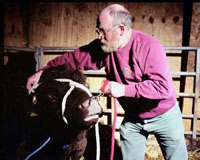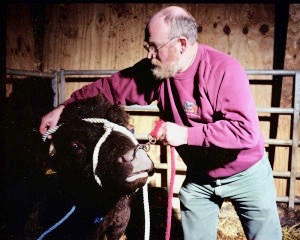
Duncan MacIntyre

Photo courtesy of Bute and Cowal Vets
Dr. Duncan MacIntyre is the only veterinarian on Scotland's Isle of Bute, which has a population of about 6,500 and declining. MacIntyre worries that telemedicine will push practitioners in remote communities out of business.
Dr. Duncan MacIntyre, a 69-year-old veterinarian who runs the only practice on the remote Scottish island of Bute, has made the 500-mile ferry and bus trip down to London just twice in his life.
The first time was more than a decade ago, to attend a course about treating cattle. The second was on July 12, to question leaders of the Royal College of Veterinary Surgeons (RCVS) from the floor of their annual general meeting.
MacIntyre fears that the RCVS — the U.K.'s chief regulatory body for the veterinary profession — is about to loosen rules that restrict prescribing drugs over the internet.
He is concerned about the usual pitfalls associated with the online-prescribing aspect of telemedicine, such as the risks of misdiagnosis, miscommunication and antimicrobial resistance. And he's particularly worried about the effect on practices in far-flung locations like his own.
If, as he expressed to the RCVS, an area is served by only one small practice, that practice could be put out of business if clients use a telemedicine service instead.
"This may seem like protectionism or self-interest, but my real concern is that animal welfare in such areas will suffer greatly with no hands-on practice left," he told the VIN News Service via telephone from his practice on Bute.
MacIntyre was told by then-RCVS president Dr. Amanda Boag that his points would be taken under consideration.
MacIntyre is not, of course, the only veterinarian concerned about the risks of telemedicine, the rise of which has become an increasingly thorny issue for regulators in the U.K. and other developed markets, including the U.S., Canada and Australia.
Last month, the American Veterinary Medical Association revised the country's model practice act to stress that establishing a "veterinarian-client-patient relationship" must involve in-person examinations.
In the U.K., veterinarians cannot diagnose conditions or prescribe treatments without hands-on examinations, either, according to the "under-care" guidelines in the RCVS's code of professional conduct. The guidelines imply some exceptions, such as for groups of farm animals, where visiting one or two beasts usually is sufficient to provide ongoing treatment for an entire herd.
Since at least 2017, however, the RCVS has been actively considering whether to update some of its rules to accommodate the advantages that telemedicine is said to provide.
Benefits touted by proponents include offering efficient, convenient access to care and allowing veterinarians to observe symptoms in real time. Avoiding a trip to a physical practice also puts less stress on animals, while long-distance prescribing can make care accessible to those living in areas where there are no veterinarians.
The RCVS stirred controversy last year when it announced that it was planning a trial involving a single telemedicine-only company, which it did not identify.
That company would, temporarily and under monitoring, be made exempt from existing under-care rules, essentially allowing its veterinarians to prescribe medication online without a need for a prior physical examination.
The plan sparked an outcry from the profession, and the trial has been put on ice while the RCVS seeks legal advice and reviews its approach to the rules.
"The pilot has been delayed indefinitely pending the outcome of the wide-ranging review," RCVS spokesperson Luke Bishop said in an emailed response to questions from VIN News.
Bishop said the "current state of play" is that the RCVS continues to review the code of conduct, specifically related to under-care rules and the provision of 24-hour emergency cover.
Perceived conflicts of interest, closed session at issue
Many veterinarians suspect that change is coming. MacIntyre was among three practitioners who questioned RCVS officials about telemedicine during the group's meeting in July. Another four practitioners submitted written questions on the subject, according to meeting minutes.
Other questions concerned the potential for conflicts of interest. Four of the RCVS Council's 18 elected members work for companies that offer telemedicine services, judging from biographical information posted on the RCVS website. One is the veterinary director of telemedicine company Virtual Vet Derms, while three work for Independent Vetcare, which launched an in-house telemedicine service in June.
Of the two appointed, but not elected, veterinary nurse members of the council, both are employed by Independent Vetcare, one of the largest practice operators in the U.K. and Europe.
The council also has seven university-appointed members and six appointed lay members, none of whom is employed by a company that offers telemedicine services.
The RCVS's Bishop said that all council members are expected to manage conflicts of interest and adhere to confidentiality requirements when discussing RCVS rules. "The duty of confidentiality is not implied; it is explicit in papers that are marked 'confidential,' " he added.
Criticism also has been leveled about the way the RCVS is conducting the debate. In June, for instance, it held a consultation on remote prescribing during a closed session.
The decision to exclude the public prompted the president of the British Veterinary Association, Dr. Simon Doherty, to write to Boag requesting "urgent clarification" of the regulator's plans. The BVA is the U.K. veterinary profession's chief representative body.
Doherty told VIN News that the BVA has since had an "open conversation" with RCVS representatives, who explained that they met privately to consider legal advice.
"We're a self-regulated profession, and the college should be able to seek legal advice without necessarily having to make every last detail public," Doherty said via telephone. "By the same token, in terms of an open consultation, we're keen to be part of those discussions."
Doherty said the BVA is not opposed to embracing advances in telemedicine per se. He noted that veterinarians already have been advising patients — and each other — over phones and computers for decades. He also accepts that new technology, such as wearable monitoring devices and innovative diagnostics tools, is making the remote care of animals more feasible.
But when it comes to under-care rules, he said the BVA's position has not changed: Online prescribing should be preceded by a hands-on inspection of companion animals, or a regular farm visit for livestock.
"To change regulations to allow remote prescribing without undertaking a physical examination is not necessary for vets to embrace the opportunities offered by telemedicine," Doherty said.
Bob Partridge 250

Photo courtesy of VetDentist
Dr. Bob Partridge wants regulators to be more transparent in their deliberations on telemedicine.
Some individual veterinarians are considering demanding the RCVS hold an extraordinary general meeting, or EGM, to openly discuss online prescribing. Among them is Dr. Bob Partridge, a specialist in dentistry at VetDentist in Leeds. Partridge also attended the regular meeting in July and asked a question from the floor about RCVS leaders' relationships to large veterinary corporations.
He told VIN News that he still is not satisfied by the RCVS's approach to governance, despite its assurances that council members are acting in the regulatory body's best interests. He said an EGM could be called for soon if concerned veterinarians like himself do not receive more direct and detailed answers to their questions.
"The worry, I think, is that there is a clear perception from a lot of members of the profession that there is a potential conflict of interest," he said via telephone. "And a blanket denial that any conflict might possibly occur just doesn't sit straight."
Council members with connections to companies offering telemedicine services ought to recuse themselves from sessions about telemedicine rules, Partridge maintains.
The RCVS’s Bishop said that just because an individual has an interest in an issue does not necessarily create a conflict. "For example, every time there is a decision relating to veterinary education, it would not be expected that everyone with expertise in this area, or who works in veterinary education, would need to automatically recuse themselves," he said.
On the other hand, Bishop said, when decisions are made about individuals or organizations, such as the accreditation of a veterinary school, representatives of that school would need to recuse themselves.
During the closed-door meeting in June, the council decided to review the online-prescribing rules but did not decide whether to change them. "Agreeing to review a policy is not the same as agreeing to a specific policy," Bishop said.
Survey finds wariness toward telemedicine
A recent survey of veterinarians by RCVS revealed support for limited applications of telemedicine, according to results released in March 2018. Of 1,230 respondants, 16% agreed that the definition of "under care" should be extended to allow online prescribing, with 69% opposed and 15% unsure.
However, when asked if "certain classifications or types" of medicines could be remotely prescribed, 52% said yes, 32% said no, and 15% were unsure.
Most respondents (88%) cited antiparasitic drugs as acceptable for remote prescribing, and some (25%) cited the same for vaccines. Nearly everyone who responded to the survey did not support the remote prescription of cytotoxic drugs, agents used to kill cancer cells.
Even those who did support the prescribing of some drugs via an online consultation had concerns.
"[Online prescribing] cuts a clear link that clients have to their practice," said one respondent. "Is it not in the older incontinent bitch's best interest to be physically examined once in a while?"
Products such as antiparasite drugs also could form an important part of a practice's income stream, the respondent added. "The more of that we give away, the more expensive our services become."
Among other, potentially telling, nuggets from the survey: 42% of respondents felt that online prescribing for a known animal that had been seen before for the same problem was "low risk." Another 40% thought it was a "medium risk" and just 18% felt it was "high risk" or "not appropriate at all" — suggesting that prescribing refills could be fair game for telemedicine.
On that matter, VetDentist's Partridge said he personally does not mind the idea of repeats being offered solely online — either by the veterinarian who performed the initial hands-on consultation, or by a trusted colleague at the same practice.
However, he is uncomfortable with the prospect of employees from the same large corporation offering repeats, especially if the prescribing practitioner is based on the other side of the country and has never met the practitioner who conducted the initial consultation.
"We're not Luddites saying, 'Let's put the internet back in the cupboard and lock it and never use it,' " he said. "But we do have profound concerns over the global animal welfare aspects of the encouragement of telemedicine prescribing."
Meanwhile, in Bute, MacIntyre said he is waiting on a more detailed answer from the RCVS to his question asked at the July 12 annual general meeting. According to the minutes of the meeting, Boag reassured MacIntrye that the college would consider practices in remote locations in its review.
"The president did not reassure me," MacIntyre told VIN News. "She may have attempted to reassure me, but the minutes up for the meeting are incorrect: I was not reassured."
MacIntyre also is wary that the Scottish government could one day cut subsidy support for remote practices offered under the so-called Highland and Islands Veterinary Services Scheme. The initiative allows farmers to arrange a veterinarian visit for a modest charge, supplemented by a grant to the veterinary practice to cover the cost of the visit.
"If that was to change and the Royal College was prepared to allow people to sit in a room somewhere comfortably prescribing this, that and the other, it would be a shame," he said. "The minute there's an emergency, like a cow calving in the middle of the night, there's not going to be anybody there to deal with it."
Update: The RCVS on Sept. 13 provided more details of its review process for "under-care" guidelines. It estimated the review will take another year to complete. Following public consultations, draft-making procedures and reviews of proposals, it aims to publish new guidelines in November 2020.